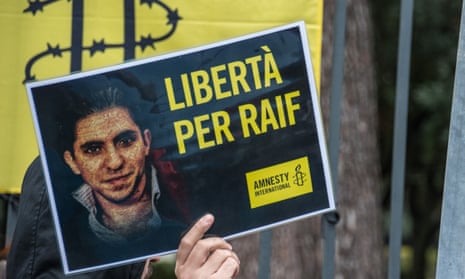Raif Badawi, the Saudi blogger and activist sentenced to 10 years in prison and 1,000 lashes for insulting Islam, has won the EU’s Sakharov prize for human rights.
The announcement was greeted on Thursday with a standing ovation at the European parliament in Strasbourg, France, but will be seen by Saudi Arabia as another diplomatic slight at a time when its domestic and international policies are coming under growing criticism.
Martin Schulz, the European parliament president, said: “I urge the king of Saudi Arabia to free him [Badawi], so he can accept the prize.”
Named after the Soviet scientist and dissident Andrei Sakharov, the award was created in 1988 to honour people and organisations defending human rights and fundamental freedoms. Badawi was one of three nominees this year, along with the Venezuelan opposition movement Mesa de la Unidad Democrática and the assassinated Russian opposition leader Boris Nemtsov.
“The European parliament has sent today a strong political and humanitarian message to Saudi Arabian authorities,” said Guy Verhofstadt, leader of the Liberal bloc. “We urge His Majesty King Salman to release Raif Badawi from prison and in any case to end the barbaric punishment of flogging.”
Badawi was arrested in 2012 on a charge of insulting Islam and indicted on several charges including apostasy. He was convicted and sentenced to seven years in prison and 600 lashes in 2013, and then re-sentenced to 1,000 lashes and 10 years in prison plus a fine in 2014. The sentence was upheld by the supreme court in June.
He received the first 50 lashes before hundreds of spectators in Jeddah in January, but subsequent sets have been postponed in the face of international condemnation and Badawi’s poor health. In March, he said it was “miraculous” that he had survived his first 50 lashes.
“All this cruel suffering happened to me only because I expressed my opinion,” he said.
Ensaf Haidar, Badawi’s wife, said this week she had been told the flogging would resume soon. She and their three children fled to Canada after receiving death threats.
Urgent: Flogging of Raif Badawi will Resume , I Hope That Mr. @JustinTrudeau Will stand for Raif Like Before! pic.twitter.com/kDfjePTA11
— Ensaf haidar (@miss9afi) October 27, 2015
Justin Trudeau, the Canadian prime minister-elect, has called Badawi’s detainment and torture unacceptable.
The human rights award comes as Saudi Arabia is buffeted by international criticism, not just for its domestic record but for its airstrikes against Houthi rebels in Yemen, which have led to many civilian casualties.
The UK earlier this month announced the cancellation of a £5.9m contract to provide a training programme for prisons in Saudi Arabia, after Michael Gove, the justice secretary, took up the issue with the Foreign Office.
The pressure on David Cameron to cancel the Saudi contract had intensified when Jeremy Corbyn, the Labour leader, called on the prime minister to block the bid to provide training for the prison system that would carry out the execution of the pro-democracy protester Ali Mohammed Baqir al-Nimr.
On Wednesday, Saudi Arabia announced that a 74-year-old British man due to be publicly flogged for possession of alcohol would be released within days. Karl Andree has been locked up since his arrest in Jeddah in August last year, when he was reportedly caught with homemade wine. Cameron had intervened personally in the case after a public outcry over Andree’s punishment.
In response to the tensions, Saudi Arabia’s ambassador to the UK, Prince Mohammed bin Nawaf bin Abdulaziz, complained in an article for the Daily Telegraph that his country was being unfairly picked on in Britain. It was, he said, “an alarming change” in tone.
However, campaigners such as the International Federation for Human Rights have called on EU member states to take a tougher line on Saudi Arabia.
Karim Lahiji, president of FIDH, said: “All EU member states should follow the example of Sweden, which ended its arms deal with Saudi Arabia after the kingdom attempted to censor its foreign minister’s speech on human rights.”

Comments (…)
Sign in or create your Guardian account to join the discussion